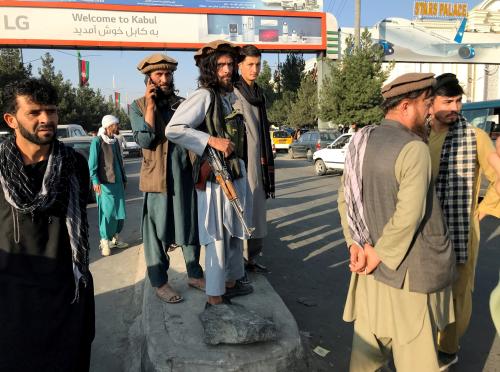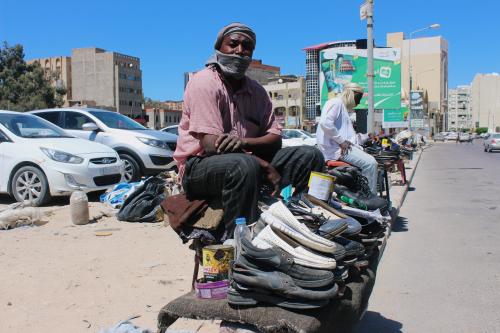Mr. Chairperson,
Honorable Ministers,
Distinguished Speakers and Guests,
I have asked the Co-Director of the Brookings Institution-SAIS Project on Internal Displacement to present my remarks since I am unfortunately unable to be with you today.
Let me begin by welcoming all of you and expressing my support and appreciation to the International Organization for Migration (IOM) and the Economic Community of West African States (ECOWAS) for organizing this Workshop on International Migration in West Africa.
The IOM has long played an important role in providing assistance to migrants throughout the world, whether their migration is forced or voluntary. It also is to be commended for its more recent involvement with situations of forced internal migration. As you know, internally displaced persons are people forced from their homes by armed conflict, human rights violations and natural and human-made disasters, who remain within the borders of their own countries. They are a category of forced migrant who often become refugees if national protection and assistance are not available; conversely many refugees who return to their home countries and find no safety or sustainable solutions become internally displaced. IOM’s constitution is unique in encompassing displaced persons who both migrate internally and internationally and I am pleased that the agenda of this workshop includes the concerns of both groups.
The Economic Community of West African States, one of Africa’s leading sub-regional organizations, has also become increasingly involved with the issue of internal displacement. Its conflict prevention and management mechanisms and growing focus on humanitarian issues relates directly to the plight of internally displaced persons. As an African, this is a very important development. Although an estimated 25 million people in more than 40 countries are forcibly displaced within the borders of their own countries, Africa is the worst hit continent, counting more than half of the world’s internally displaced persons. Indeed, there are an estimated 12 to 13 million persons in Africa forcibly displaced within the borders of their own countries by conflict, ethnic strife and human rights violations. In the sub-region of West Africa, several million people are reported to be either internally displaced, refugees or returnees trying to rebuild their lives after years of being uprooted.
My office was pleased to be represented in 2000 at an ECOWAS Conference on War-Affected Children in West Africa, held in Ghana. The conference drew attention to the plight of internally displaced children, and its declaration welcomed the Guiding Principles on Internal Displacement. The Guiding Principles, I would note, are the first international standards for internally displaced persons. They were developed under my direction at the request of United Nations bodies and were presented to the Commission on Human Rights in 1998. At the Ghana meeting, the ECOWAS Ministers Declaration called for the application of the Principles by ECOWAS member states. The application of the Principles was further discussed at a conference hosted by the Government of Austria in 2000, in which ECOWAS actively participated. As a result of the discussions in Vienna, I visited ECOWAS headquarters in Abuja in 2001 and held most constructive discussions with Executive Secretary, Ambassador Lansana Kouyate, and Director of Judicial Affairs, Mr. Roger Laloupo. I pointed out during these discussions that United Nations General Assembly and Commission on Human Rights resolutions specifically call upon regional organizations, together with the Representative, to convene seminars on the Guiding Principles. There was, I am pleased to note, strong support for ECOWAS’ holding a seminar on internal displacement and it was suggested that my office participate in today’s Workshop on International Migration in West Africa: Concepts, Data and Legislation, and integrate into its program of activities the issue of internal displacement.
One of the themes of the IOM-ECOWAS cooperative program involves migration, human security and regional stability. It is evident that conflict and displacement shatter lives and undermine human security, in particular by breaking up family and community ties, terminating employment relationships, halting formal educational opportunities, depriving people of adequate food and shelter, and making displaced populations especially vulnerable to acts of violence. It is also evident that conflict and displacement spill over borders and can create regional economic and political turmoil. Indeed, UN Secretary-General Kofi Annan has warned: “If left unaddressed, internal displacement not only causes internal instability but may spill across borders and upset external and regional stability.” He said there is therefore “a compelling need for the international community to strengthen its support for national efforts to assist and protect displaced populations.”
This makes it especially important that today’s meeting, which seeks to harmonize migration terminology, data collection, and migration legislation, also integrates internally displaced persons in its efforts. Special attention is needed for collecting data about displaced populations and developing policies, laws and programs at the national level to protect and assist internally displaced persons and promote their reintegration. Participants have the opportunity to develop an effective plan of action to deal with a broad range of migration issues in the West African region. My office is pleased to cooperate in this important endeavor.


Commentary
Welcoming Remarks of the Representative of the United Nations Secretary-General on Internally Displaced Persons, Francis M. Deng
September 30, 2002